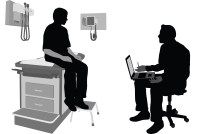Latest KFF Health News Stories
Cada vez mueren más menores por sobredosis. ¿Podrían los pediatras ayudar más?
La Academia Americana de Pediatría recomienda ofrecer buprenorfina a los adolescentes adictos a los opiáceos. Sin embargo, según los resultados de una encuesta, solo el 6% de los pediatras informa haberlo hecho alguna vez.
More Kids Are Dying of Drug Overdoses. Could Pediatricians Do More to Help?
The surge in overdose deaths among teens is opening a new path to treatment: pediatricians. A doctor in Massachusetts shows how it works with a 17-year-old patient.
For-Profit Companies Open Psychiatric Hospitals in Areas Clamoring for Care
State institutions and community hospitals have closed inpatient mental health units, often citing staffing and financial challenges. Now, for-profit companies are opening psychiatric hospitals to fill the void.
Históricamente, las enfermedades vinculadas al abuso del alcohol han afectado más a los hombres. Pero datos actuales de los Centros para el Control y Prevención de Enfermedades (CDC) muestran que las tasas de muerte por esta causa están aumentando más rápido entre las mujeres que entre los hombres.
More Women Are Drinking Themselves Sick. The Biden Administration Is Concerned.
Historically, alcohol use disorder has disproportionately affected men. But targeted advertising and changes in societal norms over the past 50 years have led to an upsurge in alcohol-related diseases and deaths among women. “It’s a very taboo topic,” one expert said.
California Is Expanding Insurance Access for Teenagers Seeking Therapy on Their Own
A California law that takes effect this summer will grant minors on public insurance the ability to get mental health treatment without their parents’ consent, a privilege that their peers with private insurance have had for years. But the law has become a flashpoint in the state’s culture wars.
Adolescentes podrían ir al psicólogo sin tener el permiso de sus padres
Según la nueva ley en California, los jóvenes podrán hablar con un terapeuta sobre la identidad de género sin el consentimiento de sus padres. Pero no podrán recibir tratamiento residencial, medicación o cirugía de afirmación de género sin el visto bueno de sus padres, como han sugerido algunos opositores.
La nueva ola de propuestas estatales, impulsada por familias que perdieron familiares después de enfrentamientos con la policía, marca un paso importante para desterrar un término que los críticos dicen que incita a la policía a usar fuerza letal en exceso.
Amid Mental Health Staffing Crunch, Medi-Cal Patients Help One Another
Peer leaders can help ease the shortage of mental health providers and build trust through shared experiences, state health officials say. In 2022, California started allowing counties to use Medicaid dollars to pay them for their work.
As More States Target Disavowed ‘Excited Delirium’ Diagnosis, Police Groups Push Back
After California passed the first law in the nation to limit the disavowed term “excited delirium,” bills in other states are being introduced to help end use of the diagnosis. But momentum is being met with resistance from law enforcement and first responder groups, who cite free speech.
Ya hay una droga oral para la depresión postparto… pero cuesta $16,000
Abogados, defensores y reguladores están observando de cerca cómo las aseguradoras diseñarán las normas para cubrirlo.
Secret Contract Aims to Upend Landmark California Prison Litigation
California has commissioned an exhaustive study of whether its prisons provide a constitutional level of mental health care, which it could use to try to end one of the lawsuits that have federal courts overseeing the state’s prisons. But corrections officials won’t disclose even basic details of the consultants’ contract, including its cost to taxpayers.
A New $16,000 Postpartum Depression Drug Is Here. How Will Insurers Handle It?
A pill form of an effective drug for postpartum depression hit the market in December, but most insurers do not yet have a policy on when or whether they will pay for it. The hurdles to obtain its predecessor medication have advocates worried.
En 2022, el año más reciente del que se dispone de datos, 7,385 californianos murieron por sobredosis relacionadas con opioides, de los cuales el 88% involucró fentanilo, un opioide sintético que puede ser 50 veces más potente que la heroína.
California May Face More Than $40M in Fines for Lapses in Prison Suicide Prevention
A court expert reported that California prisons continue to lag on 14 of 15 suicide prevention measures, and even regressed in some areas. The state could face more than $40 million in fines after a federal judge warned more than a year ago that she would impose penalties for each violation.
Why Even Public Health Experts Have Limited Insight Into Stopping Gun Violence in America
After the 1996 Dickey Amendment halted federal spending on research into firearms risks, a small group of academics pressed on, with little money or political support, to document the nation’s growing gun violence problem and start to understand what can be done to curb the public health crisis.
Statistical Models vs. Front-Line Workers: Who Knows Best How to Spend Opioid Settlement Cash?
A mathematical model designed to direct spending of opioid settlement funds is at the center of a debate over whether to invest in technology to guide long-term decisions or focus on the immediate needs of people in addiction.
Journalists Examine Medicaid Unwinding, Farmworkers’ Mental Health, and the Big Opioid Payback
KFF Health News and California Healthline staff made the rounds on national and local media this week to discuss their stories. Here’s a collection of their appearances.
California Hospitals, Advocates Seek Stable Funding to Retain Behavioral Health Navigators
California has supported expanded use of medications in the fight against opioid use disorder and overdose deaths. But hospitals and addiction treatment advocates say the state needs to secure ongoing funding if it wants more behavioral health workers to guide patients into long-term treatment.
Readers Call on Congress to Bolster Medicare and Fix Loopholes in Health Policy
KFF Health News gives readers a chance to comment on a recent batch of stories.




















